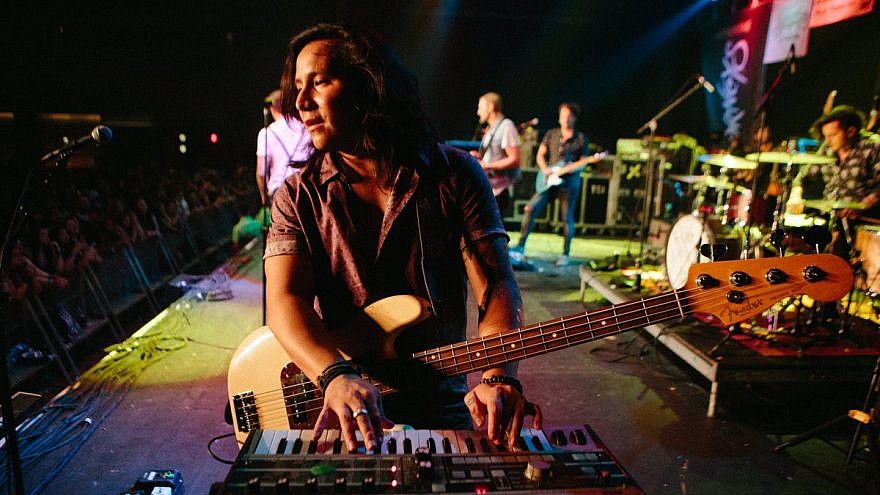In 2012, Dave Rublin, 31, was a struggling New York musician with the long hair, tattoos and a restaurant job to prove it. His Jewish mother in New Jersey played her part, worrying about her starving son, “the artist.”
Just a year later, Rublin and his bandmates—friends he met at the Berklee College of Music in Boston a few years earlier, penned a catchy rock tune called “Best Day of My Life.” (You and millions of others have heard it on the radio and in major films, television shows and commercials.) The rest is rock-n-roll history.
This interview has been edited for length and clarity.
JNS: Before I forget, I hear you have two roommates, right?

Dave Rublin: That’s right! I have two cats named Hamburger and Froggy. They’re downstairs just hanging out.
JNS: So what can you tell me about the new album?
DR: The new album is coming along great. We’re putting it out starting with one song sometime this month, then others coming out in batches. We don’t want to overwhelm everyone with two years of intense work. It’s very intriguing right now, getting all the songs back every week.
JNS: How’s your sound evolving on this one?
DR: We’re really departing from the world people remember us in—that poppy, banjo, fun, positive band. We all hit our 30s, and we want to tap into the reality and struggles of everyday people, things we’ve seen on the road that have resonated with us in our lives. This record is going to be very introspective, and more rock and more serious. Almost like a Kings of Leon meets Imagine Dragons meets Kanye West.
JNS: Your Jewish background is pretty interesting. Can you tell me more about it?
DR: I grew up in Maplewood, N.J. Yeah, my upbringing was really interesting. My brother is Mexican. My sister is Colombian, and I’m Colombian. We were all adopted by this wonderful Jewish family. I did the Sunday-school thing, I did the bar mitzvah thing, the Hebrew-school thing, and I even went to a Jewish summer camp. Half the reason I’m here is because Jewish people let me into their home. If I wasn’t let into their home and they didn’t nurture me, I wouldn’t have met those guys in college, formed the band and written “Best Day of my Life.”
JNS: Were you guys observant?
DR: The thing I love the most about my parents is they let me embrace Judaism in my own way. They didn’t pressure me at all. I went to synagogue sometimes. That’s where my love for music really began actually.
JNS: Oh, yeah?
DR: I remember going to temple, and it was all very music-based, with all the prayers being sung. It was the first time I exercised my muscle memory for remembering melody. To this day, I can recite all the prayers I grew up learning. I remember all the melodies.
JNS: That’s so cool. Excluding singing in synagogue, what’s your favorite place you have played?
DR: I loved playing Red Rocks Amphitheatre in Morrison, Colo. That was one of the biggest moments of my life. I know how many people great artists have graced that stage. It felt like a rite of passage.
JNS: Speaking of touring, playing in Israel is a hot topic these days. What are your thoughts on Roger Waters and others trying to prevent artists from playing shows in Israel?
DR: What’s the point of music if it’s not bringing people together? It’s about saying we love this one thing, and it’s great, so let’s all enjoy this and forget about the hate for a minute. If we can do that, then we’re doing the world a service. Music should be shared.
JNS: So, would you guys play in Israel?

DR: Definitely. We got offered a couple of shows there, which was awesome. This was in 2014, with our first record out. We were about to confirm in Israel, but then, with all of the missile warnings [related to the Israel’s “Operation Protective Edge” and the conflict with Gaza], we had to cancel. It was devastating because of course we’d like to play there. I had been to Israel on Birthright, so I already knew how special Israel was.
JNS: Birthright! How was your trip?
DR: It was amazing, a life-changing experience. The band wasn’t big yet. We were nothing. I was working at a restaurant in New York called ABC kitchen. My mother kept pushing me to go on Birthright. I finally got the time off to do it. I was 25 at the time. For me, it was a religious “second coming.” Our tour guide opened my mind to Judaism not only being a traditional path, but a modern path as to how you carry yourself into the future with the ideals of Judaism.
JNS: Who are some artists out there that you’re paying attention to right now?
DR: Someone I really enjoy a lot is Jack Garratt, a music producer from the U.K. who writes really incredible music. I really love all the stuff Miguel is putting out. Vince Staples is another one. I’m also really loving Brockhampton, and I’m really into Francis and the Lights, and obviously, Bon Iver. I’m obviously way into him.
JNS: Obviously.
DR: Obviously.

























